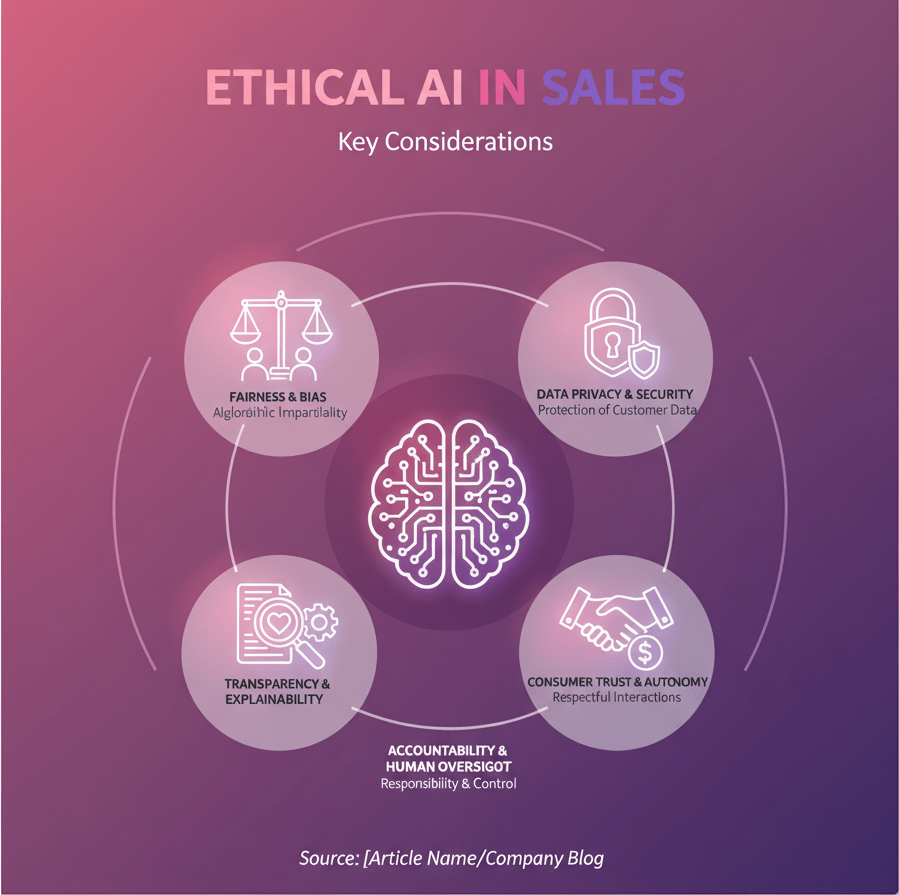“Navigate the ethical considerations of AI in sales: learn about data privacy, avoiding bias, ensuring transparency, and using AI responsibly to build lasting customer trust.”
The sales world is changing fast. Artificial intelligence (AI) now plays a big part. It helps sales teams work smarter. But with this power comes a duty. We must use AI correctly. This means thinking about ethics. We need to ensure that AI benefits customers, not just our bottom line. This guide will walk you through the key ethical points. We’ll explore how to utilize AI in sales in a responsible manner.

Why Ethics Matter in AI Sales
Think about it. AI touches sensitive areas. It deals with customer data. It shapes how we talk to people. If used poorly, AI can hurt trust. It can even break laws. However, if we utilize it effectively, AI can foster stronger, more meaningful relationships. It can make sales fair and open.
This isn’t just about avoiding problems; it’s about preventing them. It’s about doing good business. Customers want to trust you. They want to know you respect them. Ethical AI in sales shows that. It shows you care.
The Rise of AI in Sales
AI is everywhere in sales now. It helps find leads. It personalizes messages. It even predicts what customers might buy. Tools powered by AI can schedule meetings. They can answer common questions. They can even analyze sales calls. This makes salespeople much more efficient.
However, this quick adoption means we need to slow down. We need to think. Are we using these tools effectively? Are we being open about it? These are big questions. And they need good answers.
Key Ethical Considerations
Let’s break down the main ethical challenges. Each one needs careful thought.
1. Transparency: Being Open About AI Use
Imagine talking to someone. You think it’s a human. But it’s actually AI. How would you feel? A bit tricked. That’s why transparency is vital. Customers have a right to know when they’re interacting with AI.
Transparency isn’t just about chatbots. It’s also about how you use AI to personalize emails. Or how it helps decide which products to recommend. If AI is influencing a customer’s experience, they should be aware of it.
Why Transparency Builds Trust
Trust is the bedrock of sales. Without it, you have nothing. Being open about AI shows you have nothing to hide. It tells customers you respect their intelligence. It also sets clear expectations. If a customer knows they’re talking to AI, they understand its limits.
Customers are getting smarter. They know AI is out there. Trying to hide it can backfire. It can cause resentment. It can break trust that’s hard to rebuild. So, be upfront. It pays off in the long run.
How to Be Transparent
- Disclose Chatbot Use: A simple message at the start of a chat is good. “You are currently chatting with our AI assistant.”
- Explain AI-Powered Personalization: Briefly mention how you use AI to tailor recommendations. “We use AI to suggest products you might like based on your past activity.”
- Train Your Team: Ensure your sales team understands how and when to discuss AI effectively. They should feel comfortable explaining their role.
- Clear Privacy Policies: Your privacy policy should clearly state how AI uses customer data.
Transparency isn’t a one-time thing. It’s a commitment. It needs ongoing effort.
2. Data Privacy and AI: Protecting Customer Information
AI needs data. Lots of it. It learns from past interactions. It analyzes customer preferences. This data is sensitive. It belongs to your customers. Protecting it is not just ethical. It’s often a legal requirement.
Think about all the data AI in sales might use. Contact details. Purchase history. Website browsing behavior. Even conversation transcripts. This information can be very personal. Misuse can lead to big problems. It can lead to identity theft. It can lead to reputation damage.
Legal Frameworks: TCPA and GDPR
Two big laws stand out here:
- GDPR (General Data Protection Regulation): This is a European law. It’s strict about how personal data is collected and used. If you deal with customers in the European Union, you must comply with the GDPR. It requires explicit consent for the use of data. It gives individuals rights over their data. This includes the right to access and delete it.
- TCPA (Telephone Consumer Protection Act): This is a U.S. law. It regulates telemarketing calls, faxes, and texts. AI-powered dialing systems and SMS tools must comply with the TCPA. This means getting proper consent before contacting people. It means respecting “do not call” lists.
Breaking these laws can result in substantial fines. It can also destroy your brand’s standing. So, compliance isn’t optional. It’s essential.
Best Practices for Data Privacy
- Only Collect What You Need: Don’t gather data just because you can. Only take what’s necessary for your sales process.
- Get Clear Consent: Always Obtain Permission. Make it easy for customers to understand what data you’re collecting. Explain how you’ll use it.
- Secure Your Data: Invest in strong cybersecurity. Encrypt data. Use secure servers. Regularly audit your systems.
- Anonymize When Possible: Can your AI achieve its goal without knowing specific names? If so, anonymize data. This reduces risk.
- Limit Data Access: Only allow authorized personnel to access sensitive data.
- Data Retention Policies: Don’t Keep Data Forever. Have clear rules for how long you’ll store it. Delete it when it’s no longer needed.
- Train Employees: Ensure that all team members understand and comply with the data privacy rules. They are your first line of defense.
Data privacy is a continuous effort. It requires constant vigilance.
3. Avoiding Bias in AI Algorithms
AI learns from data. If that data has biases, the AI will also be aware of them. This is a significant ethical concern. Imagine an AI that favors specific demographics. Or one that ignores certain types of customers. This can lead to unfair treatment. It can lead to missed opportunities.
Bias can creep in unintentionally. Historical sales data might show patterns. These patterns reflect past biases. For example, if your sales team historically focused on a particular group, the AI might learn to do the same. This can exclude potential customers. It can lead to a less diverse customer base.
Where Bias Can Show Up
- Lead Scoring: AI might score leads based on factors that are not truly predictive of success. These factors could reflect existing biases.
- Personalized Messaging: AI might craft messages that are less effective for specific groups. Or it might fail to reach them at all.
- Product Recommendations: AI might only recommend products to specific demographics. This could limit choices for others.
- Pricing: In some cases, AI could lead to unfair pricing differences. This is a very sensitive area.
How to Combat Bias
- Diverse Data Sets: Train your AI on a wide range of data. Ensure it accurately represents your entire customer base.
- Regular Audits: Periodically check your AI’s outputs for signs of bias. Are certain groups being underserved? Are others being over-targeted?
- Human Oversight: Don’t let AI run completely unsupervised. Have humans review its decisions. They can catch biases the AI misses.
- Fairness Metrics: Use specific metrics to measure fairness in your AI’s performance.
- Explainable AI (XAI): Choose AI tools that can explain their decisions. If an AI can tell you why it made a recommendation, it’s easier to spot bias.
Fighting bias is ongoing work. It requires commitment from everyone.
4. Enhancing, Not Manipulating, the Customer Experience
AI in sales should enhance the customer experience. It should make their journey smoother. It should provide more relevant information. It should never be used to trick or pressure people. This is the core ethical line.
Manipulation refers to the use of AI to exploit vulnerabilities in systems or networks. It means nudging customers towards decisions that aren’t in their best interest. It means using psychological tricks powered by data. This is a dangerous path. It destroys trust instantly.
Examples of Manipulation to Avoid
- Dark Patterns: These are user interface tricks. They make it hard to opt out or cancel. Or they push users into making confident choices. AI can create these patterns more subtly.
- Exploiting Emotional States: Using AI to detect a customer’s emotional state to apply undue sales pressure.
- Misleading Personalization: Presenting limited options as the “perfect fit” when they are not.
- Creating False Urgency: AI may generate messages that create artificial deadlines or develop a sense of scarcity.
Ethical AI for a Better Experience
Instead, use AI to help truly.
- Provide Relevant Information: AI can surface exactly what a customer needs to know, right when they need it.
- Personalized Recommendations: Help customers discover products they will genuinely love and benefit from.
- Efficient Support: AI chatbots can quickly answer common questions. This frees up human reps for more complex issues.
- Streamlined Processes: Use AI to remove friction from the buying journey. Make it easy to buy. Make it easy to get help.
- Proactive Assistance: AI can anticipate customer needs and provide tailored solutions. It can offer help before a problem even arises.
The goal is to serve, not to sell at all costs.
Human-in-the-Loop AI: The Essential Partnership
Even the most advanced AI requires human oversight. This is “human-in-the-loop” AI. It means humans are always involved in the AI process. They train it. They monitor it. They step in when needed.
AI is a tool. It’s a potent tool. But it’s not a replacement for human judgment. Sales is about relationships. It’s about empathy. It’s about understanding the complex needs of humans. AI can’t do that alone.
Why Human Involvement is Crucial
- Context and Nuance: Humans are attuned to subtle cues. They get emotions. AI struggles with these.
- Ethical Oversight: Humans can spot potential ethical missteps. They can correct biases.
- Complex Problem Solving: When a customer has a unique or complex problem, a human needs to step in. AI excels at routine tasks.
- Building Rapport: True connection comes from human interaction. AI can’t replicate genuine empathy.
- Preventing Errors: AI can make mistakes. Humans can catch them before they cause harm.
- Adapting to Change: The world is constantly changing. Humans are better at adapting to new situations.
How to Implement Human-in-the-Loop
- AI as an Assistant: Position AI as a helper for your sales team. It handles the grunt work. Humans focus on high-value interactions.
- Regular Reviews: Have humans regularly review AI-generated content to ensure accuracy and quality. Check its recommendations. Look at its messaging.
- Escalation Paths: Make it easy for customers to switch from AI to a human. Don’t trap them in an AI loop.
- Feedback Loops: Allow sales reps to give feedback to the AI. This helps it learn and improve.
- Training and Coaching: Use AI insights to train your sales team. Help them excel even further in their roles.
Human-in-the-loop AI is about teamwork. It’s about combining the best of both worlds.
Maintaining a Personal Touch with AI
Some worry AI will make sales impersonal. That’s a valid concern. But it doesn’t have to be that way. AI can actually help sales teams be more personal.
How? By taking away the repetitive tasks. AI can handle scheduling. It can draft initial emails. It can quickly find relevant customer data. This frees up sales reps. It gives them more time to focus on what matters. More time to build genuine connections. More time for meaningful conversations.
Using AI to Enhance Personalization
- Contextual Information: AI can provide reps with a comprehensive view of a customer’s history. This helps them tailor conversations.
- Identify Key Moments: AI can flag when a customer is most likely to need human interaction.
- Intelligent Segmentation: AI can help segment customers more precisely. This enables highly targeted and relevant outreach.
- Drafting Personalized Content: AI Can Assist with Writing Emails. It can suggest talking points. However, humans always review and edit their work. They add their unique voice.
The goal isn’t to replace the human touch. It’s to amplify it. It’s to make every human interaction more valuable. More informed. More personal.
The Future of Ethical Sales
Ethical AI in sales isn’t a trend. It’s a must-have. As AI gets smarter, so must our approach to using it. The future of sales depends on trust. It depends on respect. It depends on genuinely helping customers.
Companies that prioritize ethical AI will win. They will build stronger relationships. They will earn better reputations. They will stand out in a crowded market.
This means constant learning. It means regular evaluation. It means always putting the customer first. It means seeing AI as a powerful assistant, not a shortcut to manipulation.
SalesCloser.ai: Designed with Ethics in Mind
We understand these challenges at SalesCloser.ai. We built our platform with ethical principles at its core. AI should empower sales teams. It should help them build trust. It should help them succeed responsibly.
Transparency Features
SalesCloser.ai supports openness. Our tools are designed for clear communication.
- Clear AI Interaction Indicators: If our AI assists in a customer interaction, the design guides you to inform the customer. This ensures they are aware that they are interacting with an AI-powered system or receiving AI-generated content.
- Customizable Disclosures: Our platform allows you to create and implement custom disclosures. You can clearly state when and how AI is used in your outreach or support processes. This puts you in control of your transparency efforts.
We give you the tools to be open. You decide how and when to use them.
Commitment to Data Security and Compliance
Data privacy is non-negotiable for us. SalesCloser.ai prioritizes protecting customer information.
- Robust Security Measures: We use industry-leading security protocols. We encrypt data both in transit and at rest. We employ multi-factor authentication. Regular security audits are part of our process. Your data is safe with us.
- Compliance Frameworks: Our platform is built with compliance in mind. We understand the importance of GDPR, TCPA, and other global data regulations. We provide features that help you meet these requirements. For example, our tools help manage consent records. They also help in respecting customer communication preferences.
- Data Minimization: We design our AI to work efficiently with the least amount of personal data necessary. This reduces risk.
- User Control: We empower you to manage access to your data. You decide who sees what.
SalesCloser.ai handles sensitive data with the utmost care. We make it easier for you to stay compliant.
Avoiding Bias
We actively work to reduce bias in our AI.
- Diverse Training Data: We use broad and varied datasets. This helps our AI learn fairly.
- Ongoing Monitoring: Our team constantly monitors AI performance. We check for unintended biases. We refine our algorithms regularly.
- Human Oversight Tools: SalesCloser.ai includes features that support human review. Our tools help you quickly identify AI-generated content. You can then edit or approve it. This ensures a human always has the final say.
We strive for fairness. We give you the tools to ensure your outreach is balanced.
Enhancing the Customer Experience Ethically
Our goal is to help you serve customers better. Not to manipulate them.
- Personalization for Value: SalesCloser.ai helps you deliver truly relevant content. It enables you to suggest products that fit customer needs. It focuses on adding value.
- Efficient Engagement: Our AI automates routine tasks, allowing for more effective engagement. This frees your sales team. They can then focus on building deeper relationships. They can handle complex customer issues.
- Respectful Communication: Our tools are designed to help you craft respectful and non-pressuring messages. We focus on helpful engagement, not aggressive tactics.
SalesCloser.ai is built to improve your customer interactions. It does so in an ethical way.
Empowering Your Sales Team
SalesCloser.ai is a partner for your sales professionals.
- AI as an Assistant: Our platform acts as an intelligent assistant. It provides insights. It automates tasks. It makes your team more effective.
- Focus on Relationships: By automating repetitive tasks, our AI enables your team to focus on building human connections. They can build rapport. They can solve unique problems.
- Actionable Insights: Our AI provides data-driven insights. These help your team make smarter decisions. They can tailor their approach.
- Consistent Ethical Practice: By using SalesCloser.ai, you ensure consistent ethical behavior across your sales team. Our platform guides them.
SalesCloser.ai gives your team an advantage. It helps them be more productive. It helps them maintain high ethical standards.
Conclusion
The journey into AI-powered sales is an exciting one. It offers enormous potential. But we must navigate it with care. Ethical considerations are not roadblocks. They are guideposts. They lead to better business. They build stronger trust.
Transparency, data privacy, avoiding bias, and genuine customer enhancement are non-negotiable. Embracing human-in-the-loop AI ensures a balanced approach. It protects the personal touch.
SalesCloser.ai is committed to this vision. We provide the technology. We do it responsibly. We empower your sales teams to thrive. They can be efficient. They can be ethical. They can build lasting customer relationships. This is the path to truly successful and sustainable sales in the AI era.
Frequently Asked Questions (FAQs)
Q1: What does “ethical considerations of AI in sales” truly mean?
A1: It means thinking about the moral right and wrong of using AI in sales. It covers how AI affects customers, data, and fairness. It asks if AI is used in a way that is open, respectful, and beneficial for everyone, not just the company.
Q2: Why is transparency important when using AI in sales?
A2: Transparency builds trust. Customers appreciate knowing when they interact with AI. It prevents them from feeling tricked. It sets clear expectations about the interaction. This openness fosters stronger, more genuine customer relationships.
Q3: How can AI lead to bias in sales?
A3: AI learns from data. If that data reflects past human biases, the AI will learn and repeat them. For example, if historical sales data shows a focus on a specific customer group, the AI might prioritize them. This can lead to unfair treatment or overlooked opportunities for other groups.
Q4: What are GDPR and TCPA, and how do they relate to AI in sales?
A4: GDPR (General Data Protection Regulation) is a strict European data privacy law. TCPA (Telephone Consumer Protection Act) is a U.S. law. It regulates telemarketing communications. Both laws require companies to handle customer data carefully. They demand consent for communication. AI tools in sales must comply with these laws. This includes how data is collected, stored, and utilized for outreach purposes.
Q5: What does “human-in-the-loop AI” mean for sales?
A5: Human-in-the-loop AI means humans always oversee AI tools. AI handles routine tasks. Humans focus on complex decisions, ethical checks, and building relationships. It’s a partnership. Humans provide context, empathy, and judgment that AI lacks. This ensures AI is used effectively and ethically.
Q6: Can AI actually help maintain a personal touch in sales?
A6: Yes, it can. AI automates repetitive tasks. This frees up sales professionals. They gain more time for meaningful human interactions. AI can also provide reps with detailed customer insights. This helps them tailor conversations. This makes each personal interaction more informed and impactful.
Q7: How can I ensure my AI sales tools are not manipulating customers?
A7: Focus on enhancing the customer experience, not tricking them. Avoid “dark patterns” or creating false urgency. Ensure AI provides relevant information and genuine value. Utilize AI to streamline processes and provide valuable recommendations. Always prioritize the customer’s best interest over a quick sale.
Q8: How does SalesCloser.ai address these ethical concerns?
A8: SalesCloser.ai is built with ethics in mind. It supports transparency with clear AI interaction indicators. It prioritizes data security and compliance with robust measures. We work to reduce bias by utilizing diverse data and conducting regular monitoring. Our tools aim to enhance the customer experience ethically. We also empower sales teams by supporting human oversight.
Q9: Is ethical AI just about avoiding legal issues?
A9: No, it’s more than that. While avoiding legal issues is essential, ethical AI also builds trust. It strengthens customer relationships. It improves brand reputation. It ensures fair treatment for all customers. This leads to long-term business success. It’s about doing the right thing, not just avoiding penalties.
Q10: What role do sales professionals play in ethical AI?
A10: Sales professionals are key. They provide human oversight for AI tools. They offer feedback to improve AI. They ensure the personal touch remains. They are the frontline for ethical engagement. Their judgment and empathy are crucial for the responsible use of AI in sales.








